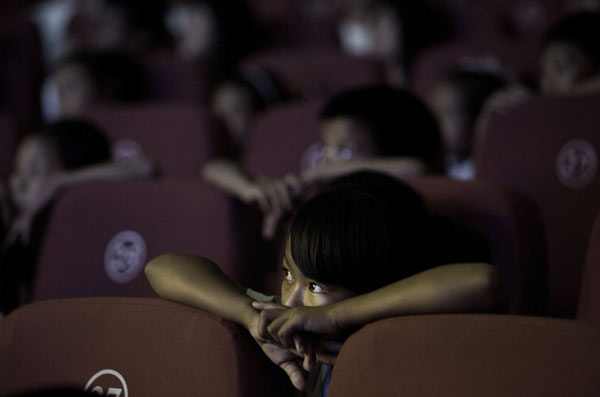Lost generation of children
 0 Comment(s)
0 Comment(s) Print
Print E-mail China Daily, May 30, 2012
E-mail China Daily, May 30, 2012
Ethnic group's AIDS orphans forced to face adult responsibilities.
Waqi Wuji is reluctant to talk about her father. He died two months ago from an AIDS-related infection and the 14-year-old from the Yi ethnic group is still struggling to reconcile herself with the new situation.
The AIDS orphan, as youngsters such as Waqi Wuji are known, is not an isolated phenomenon in her home region. Children whose parents have died of an AIDS-related illness, or have been abandoned by the remaining parent after their spouse has died, make up a large proportion of the population.
She is not technically an orphan - she has an 11-year-old sister and a 16-year-old brother as well as their mother, 45, whose poor health prevents her from supporting her family - but circumstances mean that she has lost her only real chance of formal education and, therefore, a decent standard of living.
Waqi Wuji's educational career ended when she finished her Grade 4 primary schooling, immediately after her father was diagnosed with HIV\\AIDS three years ago. Tears rolled down her cheeks as she talked about missing her education. "I would like to support my family and I would like to go back to school," she said.
Her daily jobs include helping her mother and brother work the fields and raise a pig that was donated to her family a year ago. Unlike other Yi households in the county, Waqi Wuji's family can't afford to raise a cow or an ox because they can't afford to pay the 3,000 to 7,000 yuan (US$473 to US$1,104) required to buy livestock.
"Oxen are important and precious property in a Yi household," said Zike Lame, the head of the county authority.
The flat house where Waqi Wuji and her family dwell is practically empty. The combined kitchen and living room contains little furniture, but it still qualifies as a typical middle- to lower-class Yi household.
Jida Geguo, Waqi Wuji's mother, barely understands Mandarin and cannot even pronounce her name in the language. Nihao, or "hello", is the only word she can say in Mandarin, so she always thanks the strangers who visit her home to offer advice and provide help with Kashasha, which means "Thank you" in the Yi language.
Hard Times
Jida Geguo is not alone. Very few of the locals in the region speak Mandarin at home, even though school lessons are conducted bilingually and all the signs in the county are written in both Mandarin and the Yi language.
"This presents children with great hardships when they grow up and try to move outside the mountains," said Li Yuan, a program manager for the China Children and Teenagers' Fund, who is in charge of training AIDS orphans in Sichuan province through the Spring Bud Project, which is aimed at helping young women return to school and acquire work skills. "Actually, in the process of training and helping them, we discovered that they are not accustomed to the outside world. In addition, they are severely homesick for their own culture," added Li.
"In the end, we find the best chance they have to make a living is to work in Xichang, the capital of Liangshan prefecture," he said. "If they can be trained to a sufficient standard, they will find a lot of good opportunities there."
In total, about 50 charitable organizations help to improve the children's work prospects by offering education or training facilities in Zhaojue county, Liangshan Yi autonomous prefecture, the biggest Yi group hub, situated in southwest Sichuan on the border with Yunnan province. Nearly all of the prefecture's residents, 97 percent, belong to the Yi ethnic group.
One of the 3 percent of non-Yi is Patrick Tsui, from Taiwan, who is the Zhaojue-based site manager of the social responsibility program of Micro-Star International, a US manufacturer of computer components and notebooks. Tsui has worked as deputy director of the Zhaojue youth center for 12 years, teaching basic and practical skills to help prepare kids for work in the cities. "Pragmatic living skills are what teenagers always need," he said.
Case numbers rise
The journey from Xichang, the capital of Liangshan Yi autonomous prefecture, to Zhaojue, where Waqi Wuji lives takes three bone-shuddering hours over rudimentary mountain roads. As travelers approach the center of the county, the number of signs for HIV/AIDS treatment clinics multiply.
The prefecture saw its first case of HIV/AIDS in June 1995 when an infected native came back from Yunnan province. By the end of 2010, the number of infected adults had reached almost 20,000 out of a population of 2.5 million, with 4,500 new cases registered annually, according to the prefecture office. However, unofficial estimates say the number could be much higher, possibly as many as 40,000.
The practice of drug users sharing needles was originally the prime method of transmission, but since 2001 sexually transmitted infections have emerged as a major factor.
Along with Butuo county, Zhaojue is the region most hit in terms of transmission rates. Both communities, officially designated as "poverty-stricken", have seen the work force dwindle as residents moved away to look for work in more developed regions. That huge outflux has made it harder to prevent and control the AIDS epidemic. "In the beginning, the ethnic people tried to make a living outside the Liangshan region, but the language barrier and a lack of education is a major obstacle to finding a job," said Yang Bin, the Party chief in Zhaojue. "Dealing drugs seems an easier job to them."
The region has 800,000 primary and middle school students who are exposed to the risk of drug use and HIV, according to the United Nations Educational, Scientific and Cultural Organization.






